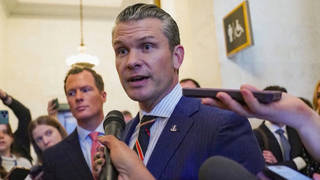HeadlinesAugust 30, 2016
Brazil: President Dilma Rousseff Takes Stand at Impeachment Trial
In Brazil, suspended President Dilma Rousseff took the stand Monday and denounced her impeachment trial as a coup.
President Dilma Rousseff: “Without an impeachable crime, any impeachment carried out by Brazilian lawmakers is a clear attack on the Constitution, because the Constitution clearly sets out the necessity for impeachment processes on the basis of a crime. An impeachment process which commits the violent act of removing an innocent president is a coup d’état.”
During her testimony, Rousseff also compared the impeachment proceedings to Brazil’s dictatorship-era military tribunals that sentenced her to prison for her activism against the regime. She was tortured while imprisoned. Despite her impassioned testimony, Brazil’s Senate is expected to vote to remove Rousseff as early as Wednesday.
Following DOJ Decision, DHS to Review Private Prison Contracts
In the United States, Department of Homeland Security Secretary Jeh Johnson has ordered DHS review its contracts with for-profit prison companies. This comes after the Justice Department told the Bureau of Prisons to end its use of private prisons earlier this month. DHS oversees a network of immigrant detention centers. About 34,000 immigrants are currently being held in for-profit detention centers. Human rights activists and some lawmakers celebrated the announcement. Arizona Congressmember Raúl Grijalva said, “This step is a tacit admission that the corporations who profit by locking up desperate adults and children undermine our decency as a nation.” As with the Justice Department’s announcement two weeks ago, the DHS move caused the plunge of stocks for GEO Group and Corrections Corporations of America, two of the largest for-profit prison operators.
Incarcerated People Across U.S. Prepare for Sept. 9 Prison Strike
This comes as incarcerated people in prisons across the United States are gearing up for a prison strike on September 9, which is the 45th anniversary of the Attica prison uprising. Organizers say this year’s strike could be one of the largest prison strikes in recent history. On Friday, about 50 formerly incarcerated people and family members of currently incarcerated people from across Alabama and Georgia gathered in Dothan, Alabama, to organize support for the strike. This is Kenneth Glasgow of the Free Alabama Movement.
Kenneth Glasgow: “Twenty-four different states, about 40 to 50 different prisons that was organized by the Free Alabama Movement to end prison slavery. We found out, by law, that those that are incarcerated, in prison, still have the rights to assemble, the rights to a prison strike, if it’s peaceful, and the rights not to be retaliated against. So those are things that we’ll be pushing.”
David Duke Endorses Donald Trump in New Louisiana Robocall
In news from the campaign trail, Donald Trump is again facing criticism over his campaign’s ties to white supremacists, after a new robocall from former Ku Klux Klan leader David Duke urges Louisiana voters to vote for him for Senate and Donald Trump for president.
David Duke: “Unless massive immigration is stopped now, we’ll be outnumbered and outvoted in our own nation. It’s happening. We’re losing our gun rights, our free speech. We’re taxed to death. We’re losing our jobs and businesses to unfair trade. We’re losing our country. Look at the Super Bowl salute to the Black Panther cop killers. It’s time to stand up and vote for Donald Trump for president and vote for me, David Duke, for the U.S. Senate.”
Trump has faced criticism in the past for initially refusing to disavow David Duke’s endorsement, although Trump and his campaign have since repeatedly disavowed Duke—including after BuzzFeed published audio of the robocall on Monday.
Trump Surrogate Tweets Image of Clinton in Blackface
Donald Trump’s campaign is also facing controversy after one of his surrogates tweeted an image of Hillary Clinton in blackface. Pastor Mark Burns is Donald Trump’s top African-American adviser. He tweeted the image on Monday, which depicts Hillary Clinton in blackface and wearing a T-shirt that reads “No Hot Sauce, No Peace.” Burns also tweeted, “Black Americans, THANK YOU FOR YOUR VOTES and letting me use you again… See you again in 4 years.” Burns later deleted the tweet, saying, “I regret the offensiveness of the black face.” Meanwhile, Donald Trump has denounced NFL 49ers quarterback Colin Kaepernick for refusing to stand during the national anthem in a protest against police brutality and in solidarity with the Black Lives Matter movement. Trump called the protest “terrible” and said “maybe he should find a country that works better for him.”
Abedin and Weiner to Separate, After New Sexting Scandal
Hillary Clinton’s top aide Huma Abedin has announced she’s separating from her husband, former New York Congressmember Anthony Weiner, after photos and reports surfaced of Weiner again sending sexual text messages. Weiner stepped down from Congress in 2011 after initially lying to the public about explicit phone and internet contact with six women he met online.
New York Times: Clinton Foundation Symbol of “Tangled Alliances”
Meanwhile, Huma Abedin and Hillary Clinton are facing increasing questions about how Abedin was simultaneously paid by the Clinton Foundation, the State Department and the global consulting firm Teneo, which is run by Doug Band, who helped start the Clinton Foundation. Abedin has also been at the center of questions after the release of emails showing the close ties between the Clinton Foundation and the State Department during Hillary Clinton’s time as secretary of state. On Monday, The New York Times editorial board called on Clinton to distance herself from the foundation as an “ethical imperative,” writing, “The Clinton Foundation has become a symbol of the Clintons’ laudable ambitions, but also of their tangled alliances and operational opacity.”
McCain & Wasserman Schultz Faces Primary Races Today
In local election news, Arizona Senator John McCain and Florida Congressmember Debbie Wasserman Schultz have their primaries today. McCain is up against Dr. Kelli Ward, a little-known former Arizona state senator. Wasserman Schultz is the former chair of the Democratic National Committee. She stepped down after WikiLeaks released nearly 20,000 emails revealing how the Democratic Party favored Hillary Clinton and worked behind the scenes to discredit and defeat Bernie Sanders. Sanders has backed Wasserman Schultz’s opponent, Tim Canova, in the primary race, although some say Sanders has not done enough to support Canova.
U.S. Has Resettled 10,000 Syrians, 0.2% of Syrians Displaced Worldwide
The White House says it has met its goal of resettling 10,000 Syrian refugees this year. That’s only about 0.2 percent of the total number of Syrian refugees registered with the United Nations. Many human rights organizations are calling on the U.S. to accept more Syrians. On Monday, Amnesty International wrote, “So many are still trapped in horrific conditions in refugee camps or war zones. The U.S. must do more.” Nearly 5 million Syrians are currently displaced outside of their country.
Italian Coast Guard: 6,500 Refugees Rescued Monday
This comes as the Italian Coast Guard says about 6,500 refugees were rescued off the coast of Libya on Monday alone. Most of the refugees were reportedly from Eritrea and Somalia.
ND: Hundreds Protest Law Firm Defending Dakota Access Pipeline
In Bismarck, North Dakota, hundreds of people protested Monday outside the offices of the law firm Fredrikson & Byron P.A., which is representing Dakota Access LLC—the company behind the $3.8 billion oil pipeline that has faced massive resistance from the Standing Rock Sioux Tribe and other tribal nations. This is Tom Goldtooth, director of the Indigenous Environmental Network.
Tom Goldtooth: “We are part of a growing movement that is condemning this colonial legal system based upon property rights.”
Black Lives Matter Delegation Returns from Standing Rock Camp
Members of nearly 100 tribal nations from across the United States and Canada have arrived at the ongoing Sacred Stone Spirit Camp, which is blocking the construction of the 1,172-mile pipeline that would transport 500,000 barrels of Bakken oil from North Dakota to Illinois. Among those who have traveled to Standing Rock is a delegation from Black Lives Matter. This is Janaya Khan, co-founder of Black Lives Matter Toronto, speaking as they filmed the construction site.
Janaya Khan: “Here we are at Standing Rock at the site of resistance. We were invited, and, by the grace of the creator, we’re here channeling Black Lives Matter on indigenous land, following indigenous and native leadership.”
Report: More Than 2 Dozen Banks Financing Dakota Access Pipeline
This comes as a new investigation has revealed that more than two dozen major banks and financial institutions are helping finance the Dakota Access pipeline. The investigation was published by the research outlet LittleSis. It details how Bank of America, HSBC, UBS, Goldman Sachs, Wells Fargo, JPMorgan Chase and other financial institutions have, combined, extended a $3.75 billion credit line to Energy Transfer, the parent company of Dakota Access LLC.
10 People Arrested Protesting Spectra Pipelines in MA and NY
Meanwhile, protests are also continuing against oil and gas pipelines in the Eastern United States. On Monday, two activists were arrested in West Roxbury, Massachusetts, after they locked themselves to cars to protest the construction of the Spectra Energy gas pipeline. In New York City, eight people were arrested blockading the doors of National Grid to protest the electric company’s support for the Spectra Energy’s AIM pipeline, which is slated to run only hundreds of feet from the aging Indian Point nuclear power plant. This is Alexandra Zevin speaking to Democracy Now! as she is getting arrested.
Alexandra Zevin: “We’re worried about the dangers of the pipelines, especially near the nuclear power plant, which is ridiculous. Why should New York state residents take all the risk, and that corporation go off with all the money? It’s ridiculous. We need solar energy. We need wind power.”
The growing protests against oil and gas pipelines come as NASA’s top climate scientist, Gavin Schmidt, is warning the Earth is warming at an “exceptional” rate that is “unprecedented in 1,000 years.”
Colorado: 2 Anti-Fracking Ballot Initiatives Fail
In Colorado, an effort to place two anti-fracking measures on the ballot in November has failed to secure enough votes. One measure would have given local communities the power to ban oil and gas projects. The other would have imposed a mandatory 2,500-foot distance between oil and gas projects and schools, playgrounds and hospitals. Organizers of the ballot initiatives say they were outspent 35 to 1 by a pro-oil campaign funded by the oil and gas industry.
CA Passes Brock Turner-Inspired Law; Turner Set to Be Freed Friday
California lawmakers voted Monday to pass a law requiring prison time for those convicted of sexually assaulting an unconscious victim. This comes in the wake of California Judge Aaron Persky’s decision to sentence Stanford University swimmer Brock Turner to a six-month prison term for sexually assaulting an unconscious woman behind a dumpster. Judge Persky said he was concerned a longer prison sentence would have a “severe impact” on Turner. Following outrage over this sentence, Persky has removed himself from hearing criminal cases. Turner is set to be released from Santa Clara jail on Friday, after serving only half of his sentence.
Puerto Rico: 6 Arrested Protesting Pro-PROMESA Media Coverage
And in Puerto Rico, six people were arrested for blocking the entrance of GFR Media, which owns three of the Puerto Rico’s top newspapers. Protesters say the media company’s coverage has been unfairly favorable to the PROMESA law, which was passed by the U.S. Congress in June, establishing a federally appointed control board with sweeping powers to run Puerto Rico’s economy. This is Mariana Nogales, a lawyer representing the arrested activists.
Mariana Nogales Molinelli: “My name is Mariana Nogales Molinelli, and I’m a lawyer. We are here because they have arrested people for protesting against GFR Media and El Nuevo Día because of their support for the Fiscal Control Board, which these media outlets have been making since the beginning. For a moment, some media outlets did express that the PROMESA law was not a good law for Puerto Rico. However, the editorial line has now changed completely to be in favor of the control board. This is the first time that they have made arrests and detained people for protesting against the control board and against groups and corporations such as GFR Media, which have expressed support for the control board.”
Most popular
- 1
- 2
- 3
- 4
Non-commercial news needs your support
Please do your part today.











Media Options